A WhatsApp CRM is software that helps businesses organize, track, and respond to all customer conversations happening on WhatsApp. Instead of managing chats on a single phone, teams use a CRM to view and reply to messages from a central dashboard. This is valuable for both ecommerce brands and service providers.
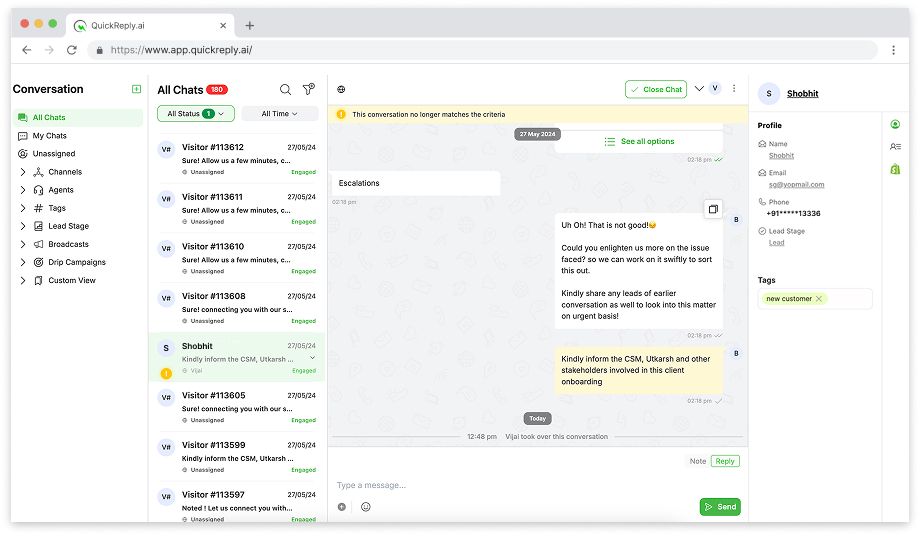
With WhatsApp CRM, businesses can assign chats to team members, automate follow-ups, and add notes or tags to each customer. This helps ensure every query gets a response, conversations are not missed, and customer history is easily accessible for future reference.
For example, an online fashion store can automatically tag new orders and assign queries about returns to a support agent. A financial consulting firm can use WhatsApp CRM to send scheduled appointment reminders and keep all client chats neatly organized.

Using WhatsApp CRM also means customer data and chat histories are never lost, even if staff members change. Everything stays connected in one place, making customer support and sales conversations smoother and more reliable.
What are the benefits of using WhatsApp CRM?
Using a WhatsApp CRM offers a wide range of benefits for businesses, from faster responses to more organized customer interactions. Let’s break down the key advantages:
1. Faster Responses and Improved Customer Satisfaction
With WhatsApp CRM, businesses can respond to customer inquiries in real-time, reducing wait times significantly. By centralizing all conversations in one dashboard, your support team can quickly pick up where others left off, ensuring no message is missed.
Example (Ecommerce):
Imagine an online store selling tech gadgets. A customer messages about a product's features. Without a CRM, your team might take longer to find the chat history and reply. But with a WhatsApp CRM, the team can instantly view all the customer’s previous interactions, speeding up response times and enhancing the overall customer experience.
Example (Service Business):
For a medical clinic offering consultations, a WhatsApp CRM helps receptionists see a patient’s past inquiries or appointment details immediately. A quick response about rescheduling a missed appointment can significantly improve satisfaction and reduce frustration.
2. Team Collaboration and Shared Access
One of the biggest advantages of using a WhatsApp CRM is that it allows multiple team members to collaborate efficiently. Rather than relying on one person to handle all messages, WhatsApp CRM lets team members assign, tag, and manage chats, making it easier to delegate and follow up.
Example (Ecommerce):
A customer reaches out with a complaint about a delayed order. With WhatsApp CRM, the complaint is tagged and assigned to the support team, while a sales rep can manage ongoing product inquiries. This allows the team to manage different types of requests without stepping on each other’s toes.
Example (Service Business):
A law firm might use WhatsApp CRM to assign client queries about legal services to specific attorneys, while receptionists handle appointment scheduling. By dividing responsibilities, each team member can focus on what they do best, improving efficiency.
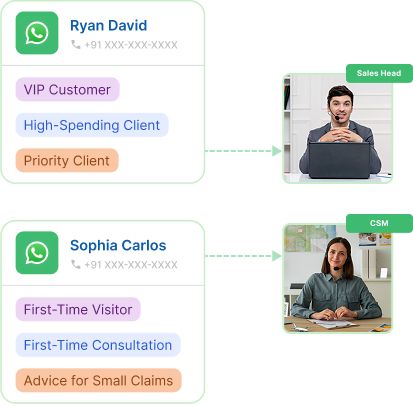
3. Automated Follow-Ups and Notifications
WhatsApp CRM automates routine tasks like sending follow-ups, reminders, and order updates, reducing manual work and improving efficiency. This helps maintain consistent communication with customers, even when your team is unavailable.
Example (Ecommerce):
Imagine a customer adds an item to their cart but doesn’t complete the purchase. With WhatsApp CRM, an automated follow-up message can be sent after a set period, reminding them about the abandoned cart and offering a discount. This kind of automated engagement can significantly increase conversion rates.
Example (Service Business):
For a wellness clinic, an automated appointment reminder via WhatsApp can be set up 24 hours before the scheduled visit. This ensures clients don’t forget their appointments, reducing no-shows and improving overall scheduling efficiency.
4. Centralized Customer Data and Chat History
WhatsApp CRM ensures that all customer data and chat histories are stored securely in one place. This is especially useful for businesses that need to track multiple interactions with the same customer. It enables your team to have a full view of each customer’s journey, without relying on separate systems or spreadsheets.
Example (Ecommerce):
A customer contacts the support team about a delayed order and mentions they also need help with a product return. With WhatsApp CRM, the support agent can instantly access the customer’s previous chats and previous order history. This complete data overview helps resolve the issue faster, with less back-and-forth.
Example (Service Business):
A client requests a follow-up on their legal matter. With WhatsApp CRM, the legal team can easily view all their previous communications with the client, ensuring that nothing is missed and that they can pick up right where the last conversation left off.
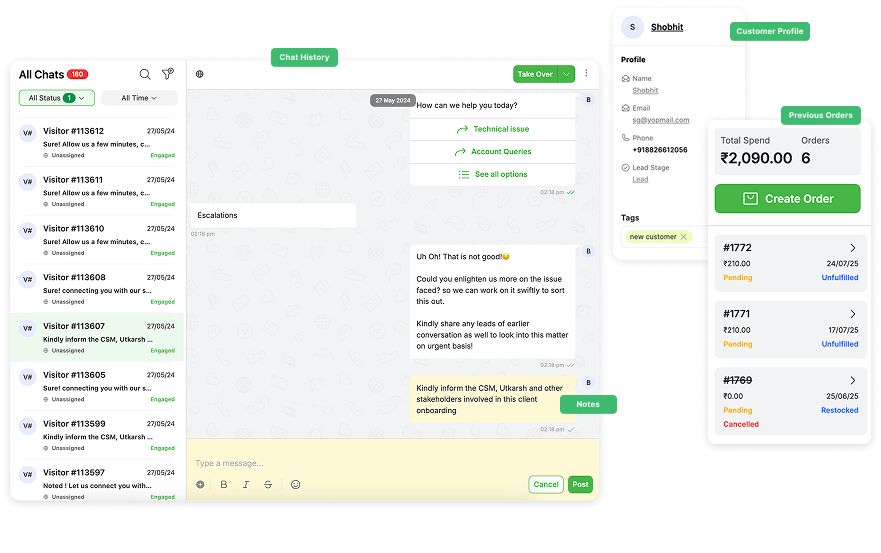
5. Improved Sales and Conversion Rates
By automating lead qualification, product recommendations, and follow-ups, WhatsApp CRM can increase conversion rates. Through automated workflows, businesses can engage with leads faster and push them down the sales funnel more efficiently.
Example (Ecommerce):
An online store that sells fashion accessories could use WhatsApp CRM to automatically send personalized product recommendations based on past browsing behavior. This not only speeds up the purchasing decision but also ensures that customers are presented with items that interest them, improving the likelihood of conversion.
Example (Service Business):
A real estate agent can use WhatsApp CRM to automatically qualify leads based on their preferences (e.g., location, price range) and send them property listings via WhatsApp, streamlining the lead-to-client conversion process.
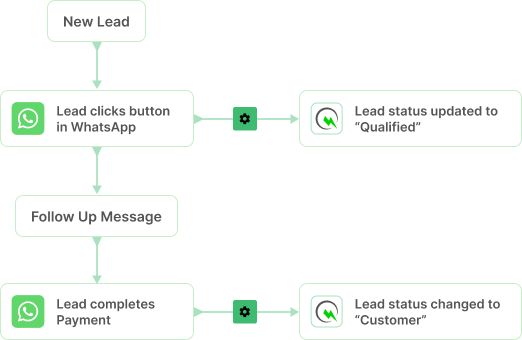
6. Data-Driven Insights and Analytics
WhatsApp CRM platforms, like QuickReply, offer reporting and analytics tools to track response times, customer satisfaction, and conversation outcomes. These insights help businesses identify trends, optimize processes, and improve decision-making.
Example (Ecommerce):
An ecommerce business can track which automated messages led to the most abandoned cart recoveries. By analyzing which types of discounts or messages perform best, businesses can refine their strategies to increase sales.
Example (Service Business):
A consulting business could track which types of consultations (e.g., first-time consultations, recurring services) generate the most interest and convert to paying clients. Analytics can help shape marketing and service delivery decisions.
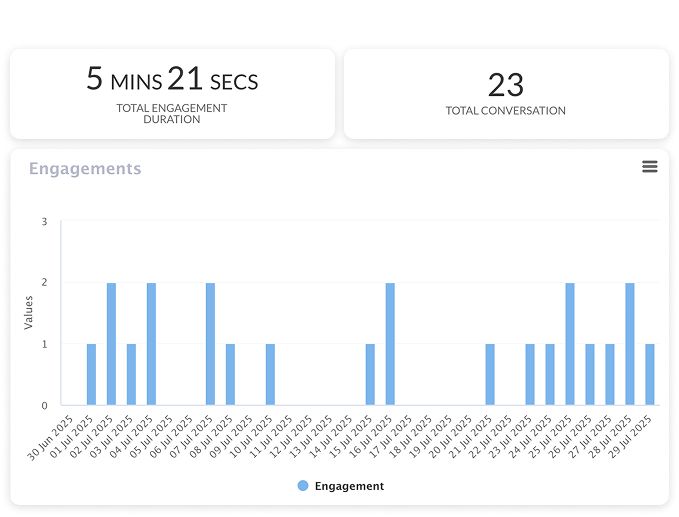
7. Increased Efficiency and Reduced Human Error
WhatsApp CRM helps minimize human error by automating repetitive tasks, reducing the chances of missed messages or forgotten follow-ups. This also frees up your team’s time to focus on high-value tasks like handling complex customer queries or developing business strategies.
Example (Ecommerce):
Without a CRM, a customer inquiry about a refund might be missed, leading to frustration. With WhatsApp CRM, automated systems ensure that every customer gets a timely response, reducing manual errors and increasing operational efficiency.
Example (Service Business):
A dental clinic can set automated reminders for patients, ensuring appointments are confirmed and reducing the likelihood of no-shows due to missed communication.
What’s the difference between WhatsApp Business API and WhatsApp CRM?
Many businesses get confused between WhatsApp Business API and WhatsApp CRM, but they are not the same. The WhatsApp Business API is the technical backbone created by WhatsApp to allow companies to send and receive messages in large volumes. It is powerful, but it does not provide any interface or dashboard for everyday use. If you only have the API, you need to build your own system or connect it to specialized software.
WhatsApp CRM is that specialized software. It connects to the WhatsApp Business API and turns it into an easy-to-use platform for your team. With WhatsApp CRM, all customer chats appear in a shared dashboard, you can assign conversations, automate responses, tag contacts, and keep detailed histories. This makes managing customer relationships practical, even for non-technical teams.
For example, if you are an online retailer, the API alone will not help your support team see customer messages or reply quickly. WhatsApp CRM takes the raw power of the API and gives you tools for automation, reminders, customer insights, and collaboration. Service businesses like real estate agencies, clinics, or consultancies, also need these features to book appointments, track queries, and keep records organized.
Why does this difference matter?
The API is essential for legal, large-scale messaging, but it is invisible and technical. Without CRM, your team is left without the tools to actually talk to customers, manage follow-ups, or work together. WhatsApp CRM makes it possible for anyone like sales, support, or operations, to handle customer conversations efficiently, with automation and analytics built in.
Platforms like QuickReply.ai combine both: secure access to the WhatsApp API and a modern CRM interface built for teams.
Key Differences Between WhatsApp Business API and WhatsApp CRM
The WhatsApp Business API is the foundation, but WhatsApp CRM is the full house, making messaging scalable, organized, and actionable for any team.
What are the types of WhatsApp CRM solutions available?
When choosing a WhatsApp CRM, it’s important to understand the different types of solutions in the market. Each type is built for different needs and business sizes, so picking the right one depends on your team, industry, and growth plans.
1. Standalone WhatsApp CRM Platforms
These are dedicated tools designed solely to manage WhatsApp conversations and customer relationships. They offer features like shared inboxes, automation, tagging, and analytics.
Example: QuickReply.ai is a standalone WhatsApp CRM built for both ecommerce and service businesses.
2. WhatsApp CRM Add-ons/Integrations
Some existing CRMs (like Zoho, HubSpot, or Salesforce) offer WhatsApp integration as an added feature. These solutions plug WhatsApp chats into your broader CRM workflows.
Example: A real estate agency using Zoho CRM can connect WhatsApp to automatically log all client conversations.
3. Multi-Channel CRM Solutions
These platforms combine WhatsApp with other messaging apps (like Facebook Messenger, Instagram, email, or SMS) in one unified dashboard. Useful if you engage customers across many channels.
Example: An online retailer managing support via WhatsApp, email, and live chat, all from one place.
How do you choose the right type?
- If your customers mostly use WhatsApp, go for a standalone WhatsApp CRM.
- If you already use a CRM for sales/support, look for a WhatsApp add-on.
- If you handle support across many platforms, consider a multi-channel CRM.
For more details on QuickReply’s standalone solution, see WhatsApp CRM features.
WhatsApp CRM solutions come in different forms. The best choice depends on your business’s messaging needs, tech stack, and growth goals.
What features should you look for in a WhatsApp CRM?
Choosing the right WhatsApp CRM is crucial for managing customer conversations efficiently. The right features help teams provide better service, automate routine work, and keep data organized. Below are the key features to look for, along with examples for both ecommerce and non-ecommerce use cases.
Essential Features Checklist
Shared Team Inbox
Lets multiple team members manage WhatsApp conversations together.
- Ecommerce Example: Support, sales, and returns queries handled in one dashboard.
- Non-Ecommerce Example: Service teams track client queries and follow-ups centrally.
Chat Assignment and Tagging
Assign chats to specific agents and tag customers for future actions.
- Ecommerce Example: Tag VIP customers or assign product inquiries to specialists.
- Non-Ecommerce Example: Assign appointment requests to relevant team members.
Automated Responses and Flows
Auto-reply to common questions, send reminders, or trigger workflows.
- Ecommerce Example: Send order updates, payment reminders, and delivery notifications.
- Non-Ecommerce Example: Automate appointment confirmations, event reminders, or document requests.
Customer Profiles and History
Store each contact’s chat history and notes for easy reference.
- Ecommerce Example: View past purchases and previous support chats.
- Non-Ecommerce Example: See client service history, consultation notes, and preferences.
Analytics and Reporting
Measure response times, chat volumes, and team performance.
- Ecommerce Example: Track peak support hours or most-asked questions.
- Non-Ecommerce Example: Monitor average handling time for appointment bookings.
Integration Capabilities
Connect with other business tools like CRMs, eCommerce platforms, or helpdesks.
- Ecommerce Example: Sync orders with Shopify or WooCommerce.
- Non-Ecommerce Example: Sync contacts with Zoho CRM or Google Sheets.
Compliance and Security
Ensure data privacy, consent management, and secure messaging.
- Ecommerce Example: Log consent for marketing updates and protect order data.
- Non-Ecommerce Example: Secure client information and handle opt-outs smoothly.
Nice-to-Have Features
- Multi-language support for diverse audiences
- Customizable chatbots for lead capture or FAQs
- File and image sharing within chats
- Role-based access for team management
- Mobile access for agents on-the-go
To see how these features work in practice, explore QuickReply.ai’s WhatsApp CRM features.
When evaluating WhatsApp CRM solutions, look for robust team features, automation, integration, and data security to make customer management smooth and scalable for any business type.
How does QuickReply’s WhatsApp CRM work?
QuickReply’s WhatsApp CRM is designed to simplify and automate all your customer interactions on WhatsApp. It brings every message, contact, and team member together in a single, easy-to-use dashboard, no technical setup required.
When you connect your WhatsApp Business API account to QuickReply, every customer message instantly appears in the shared inbox. Your team can see, assign, and respond to chats right from their computers or phones. The platform automatically creates detailed profiles for each customer, including chat history, tags, and notes, so anyone on your team can provide personalized service at any time.
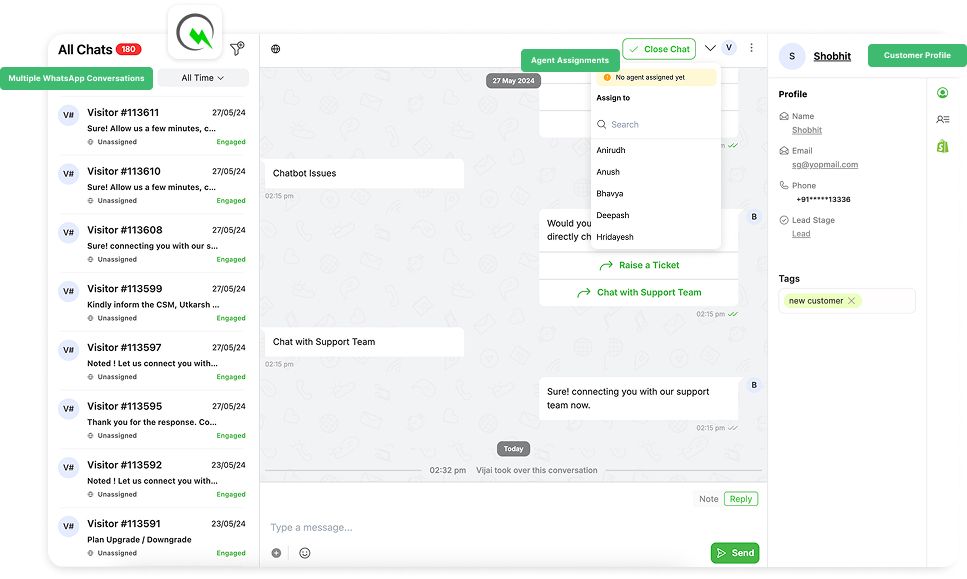
What makes QuickReply different?
QuickReply goes beyond just messaging. It lets you automate routine replies, send personalized broadcasts, and set up reminders or follow-ups with a few clicks. For example, ecommerce brands can trigger automatic order updates or cart reminders, while service businesses can automate appointment confirmations and feedback requests.
All activities are logged and tracked, giving you real-time analytics on response times, chat volumes, and team performance. QuickReply’s integrations connect your WhatsApp CRM with tools like Shopify, Zoho, and Google Sheets, so your data always stays in sync.
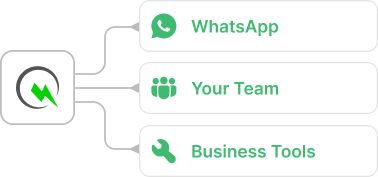
Key Features at a Glance
- Central shared inbox for all WhatsApp chats
- Automatic customer profiles with full chat history
- Assign, tag, and prioritize conversations
- Automation for replies, reminders, and campaigns
- Integration with top CRMs, e-commerce, and productivity tools
- Analytics and reporting for better decision-making
- Secure, compliant messaging built for businesses
For a deeper look at QuickReply’s capabilities, visit QuickReply.ai WhatsApp CRM features.
Summary Table: QuickReply’s Core CRM Capabilities
What are the key features of QuickReply WhatsApp CRM?
QuickReply’s WhatsApp CRM is built to help teams manage every customer chat with maximum efficiency and context. Unlike generic WhatsApp solutions, the CRM module provides a unified workspace where all conversations, customer details, and team actions are organized, helping businesses never miss a follow-up or lose important information.
Core CRM Features
Shared Team Inbox
All WhatsApp conversations arrive in a central dashboard accessible to your entire support, sales, or operations team. No more juggling phones or missing messages.
Contact & Conversation History
QuickReply automatically builds rich profiles for every contact, including previous chats, notes, tags, and activities, making it easy to pick up any conversation with full context.
Chat Assignment & Internal Notes
Assign specific chats to the right team members. Add internal notes to share updates, reminders, or special handling instructions, all visible only to your team.
Tagging & Segmentation
Organize customers and conversations with tags like “VIP,” “Pending Payment,” or “Lead.” This allows for quick filtering, search, and prioritization.
Automated Reminders & Follow-ups
Set reminders for scheduled follow-ups or unresolved issues, so nothing gets missed, even across shifts or busy periods.
Role-Based Permissions & Audit Trails
Control who can view, edit, or assign chats. See a full history of actions taken by any team member on any conversation for accountability.
Search & Filters
Instantly search chats by contact name, tag, or keyword. Use filters to view only unresolved, high-priority, or recently updated conversations.
CRM Feature Overview
Tip: These CRM features are designed for any business that needs more than just messaging, ensuring every conversation is managed with clarity, speed, and the right team context.
How does WhatsApp CRM help with sales, support, and operations?
A WhatsApp CRM is much more than a shared inbox. It acts as a central hub for all your sales, support, and operations teams, helping everyone collaborate, track progress, and deliver better customer experiences.
For Sales Teams
WhatsApp CRM helps sales reps manage leads, track interactions, and follow up on prospects. You can tag new leads, assign them to the right agent, and set reminders for timely follow-ups.
Example:
A property consultant tags new WhatsApp inquiries as “Interested,” assigns chats to sales agents, and uses reminders to schedule virtual tours.
For Customer Support
Support teams use WhatsApp CRM to instantly access a customer’s previous conversations and details. This makes it easy to resolve issues quickly and add agent-only notes for better handovers.
Example:
An ecommerce support team can resolve return requests faster by viewing past orders and previous support chats in one dashboard.
For Operations Teams
Operations staff use WhatsApp CRM to schedule appointments, confirm bookings, and coordinate across departments, all from one platform. Assignment and reminders ensure nothing gets missed.
Example:
A clinic uses the CRM to confirm appointments, share lab results, and assign follow-ups between reception and doctors.
WhatsApp CRM in Action
What are the real-world examples of businesses using WhatsApp CRM?
WhatsApp CRM is used by all kinds of businesses to centralize messaging, automate routine tasks, and create personalized customer journeys. Here’s a wide range of use cases, with examples for both product sellers and service providers:
Ecommerce Use Cases
Order Updates & Tracking
Example: A clothing brand uses WhatsApp CRM to automatically notify customers of order confirmations, shipping status, and delivery.
Customer Support & Returns
Example: A gadget retailer resolves warranty or return requests directly in WhatsApp, using chat history to speed up decisions.
Abandoned Cart Recovery
Example: A beauty brand sends gentle reminders to shoppers who left items in their cart, increasing conversions.
Loyalty & Upsell Campaigns
Example: An electronics store segments repeat buyers and sends exclusive offers or recommendations through targeted WhatsApp broadcasts.
Product Discovery & Catalog Sharing
Example: A footwear retailer shares curated product carousels with buyers, all tracked in the CRM.
Automated Feedback Collection
Example: After a purchase, a D2C home décor store uses WhatsApp CRM to collect customer reviews and ratings.
Broadcasting Offers or Announcements
Example: An online grocery store updates all subscribers about flash sales and new arrivals in a few clicks.
Non-Ecommerce (Service) Use Cases
Appointment Booking & Reminders
Example: A dental clinic books patient appointments and sends automated reminders for checkups or cleanings.
Client Support & Query Resolution
Example: An accounting firm handles tax season questions, assigning chats to relevant advisors, and logging all history.
Document & Report Sharing
Example: A diagnostic lab shares lab results securely, and lets patients follow up with questions via WhatsApp.
Event or Class Reminders
Example: A coaching center reminds students about upcoming classes, deadlines, or exam dates.
Admission & Enrollment Management
Example: An edtech institute answers application queries and sends updates about enrollment stages to parents and students.
Follow-up & Feedback Automation
Example: A legal consultancy sends automated post-service feedback requests and follows up on pending documents.
Internal Coordination & Escalations
Example: A logistics company assigns operational queries to the right branch or escalates delivery issues with internal notes.
Campaigns & Notifications
Example: A fitness center notifies members of new classes, changes in schedule, or wellness tips via WhatsApp CRM.
Repeat Service & Renewal Reminders
Example: An insurance broker sends automated reminders about policy renewals and collects required documents.
Lead Management & Nurturing
Example: A real estate agency tags prospective buyers, sets reminders for property viewings, and stores chat notes.
WhatsApp CRM Use Cases
What are the common challenges or limitations with WhatsApp CRM?
While WhatsApp CRM solves many problems, it’s important to be aware of its practical challenges before getting started.
1. API Access and Approval
To use WhatsApp CRM at scale, you typically need access to the official WhatsApp Business API. Getting approval may require business verification and clear opt-in processes for your contacts.
Example:
An ecommerce startup wants to enable automated order updates but must first complete WhatsApp’s approval and connect a verified business number.
2. Team and Feature Limits
Some CRM tools restrict the number of team seats, available automations, or depth of reporting in their entry-level plans. Larger or fast-growing businesses may need to upgrade to unlock all features.
Example:
A growing coaching center finds it needs to move to a higher-tier plan to add more counselors and automate class reminders.
3. Compliance and Data Privacy
WhatsApp CRM platforms must follow local and international privacy regulations (like GDPR), especially when handling sensitive data, consent records, and opt-outs.
Example:
A healthcare clinic using WhatsApp CRM for patient reminders must ensure all data is securely stored, access is limited, and opt-out requests are respected.
4. Integration and Workflow Complexity
Not all CRMs offer out-of-the-box integrations for every tool (like your custom ERP, accounting software, or industry-specific apps). Setting up smooth workflows can require technical support or custom development.
Example:
A logistics firm needs custom integration to link WhatsApp CRM with their delivery tracking software, requiring some technical setup.
5. User Training and Change Management
Getting your team comfortable with new CRM tools and workflows can take time, especially if they’re used to working directly on WhatsApp or via spreadsheets.
Example:
A D2C retail support team has to be trained on tagging, assignments, and analytics within the new CRM dashboard to realize its full benefit.
Common WhatsApp CRM Challenges
Ready To Turn WhatsApp Conversations Into Customer Growth?
Choosing the right WhatsApp CRM can transform the way your business communicates, helping your team manage leads, support, and operations with speed and clarity. No matter your industry or size, centralizing chats, automating tasks, and tracking every customer interaction are now possible in one easy platform.
If you’re ready to see how WhatsApp CRM can boost your sales and service, explore QuickReply.ai’s WhatsApp CRM or book a free demo to experience it firsthand.
Frequently Asked Questions
What is WhatsApp CRM and how is it different from regular CRM?
WhatsApp CRM is a customer management platform built specifically for WhatsApp conversations. Unlike traditional CRMs, it centralizes all WhatsApp chats, automates responses, and keeps conversation histories and assignments in one place.
Can small businesses use WhatsApp CRM or is it only for large companies?
WhatsApp CRM platforms like QuickReply are built for businesses of all sizes. Small businesses benefit from faster replies and better organization, while larger teams can automate workflows and manage high chat volumes.
How does WhatsApp CRM help ecommerce stores increase sales?
WhatsApp CRM enables ecommerce stores to send order updates, automate abandoned cart reminders, and handle support requests quickly—improving conversion rates and customer loyalty.
What are some common use cases for WhatsApp CRM in non-ecommerce sectors?
Non-ecommerce businesses like clinics, educational institutes, and real estate agencies use WhatsApp CRM for appointment scheduling, student/parent updates, service reminders, and document sharing.
What do I need to set up WhatsApp CRM for my business?
You need a WhatsApp Business API account and a CRM platform (like QuickReply) to get started. Most setups are quick and don’t require advanced technical skills.
Can I integrate WhatsApp CRM with my existing business tools?
Yes, leading WhatsApp CRM solutions integrate with popular CRMs (like Zoho, HubSpot), ecommerce platforms (like Shopify), and productivity apps (like Google Sheets).
Is WhatsApp CRM secure and compliant with data privacy laws?
Reputable WhatsApp CRM providers follow global privacy standards (like GDPR), offer consent management tools, and keep all customer data encrypted and secure.
How is WhatsApp CRM better than managing chats on a single phone?
With WhatsApp CRM, multiple team members can collaborate, chats are automatically assigned and tagged, and you can track every customer interaction without missing a message—even during busy periods or staff changes.
Are there any limitations or challenges with WhatsApp CRM?
Some limitations include needing API approval, potential costs for premium features, and the need to train your team on new workflows. Integration with unique business systems may also require technical support.
Can WhatsApp CRM help automate follow-ups and reminders?
Yes! WhatsApp CRM lets you set up automated replies, follow-ups for appointments or orders, and send reminders or notifications based on customer actions.



.jpg)
![How to Create a WhatsApp Business Catalog [2024]](https://cdn.prod.website-files.com/64a7e03d500c505242d97ef0/66d01a9632b92a04a2993a26_%20WhatsApp%20Business%20Catalog%20thumbnail.avif)
![How to Send Bulk Messages on WhatsApp Officially [2024]](https://cdn.prod.website-files.com/64a7e03d500c505242d97ef0/66c49d0baad48b448d0785b5_Bulk%20message%20on%20whatsapp%20thumbnail.avif)
.png)
.png)
.png)